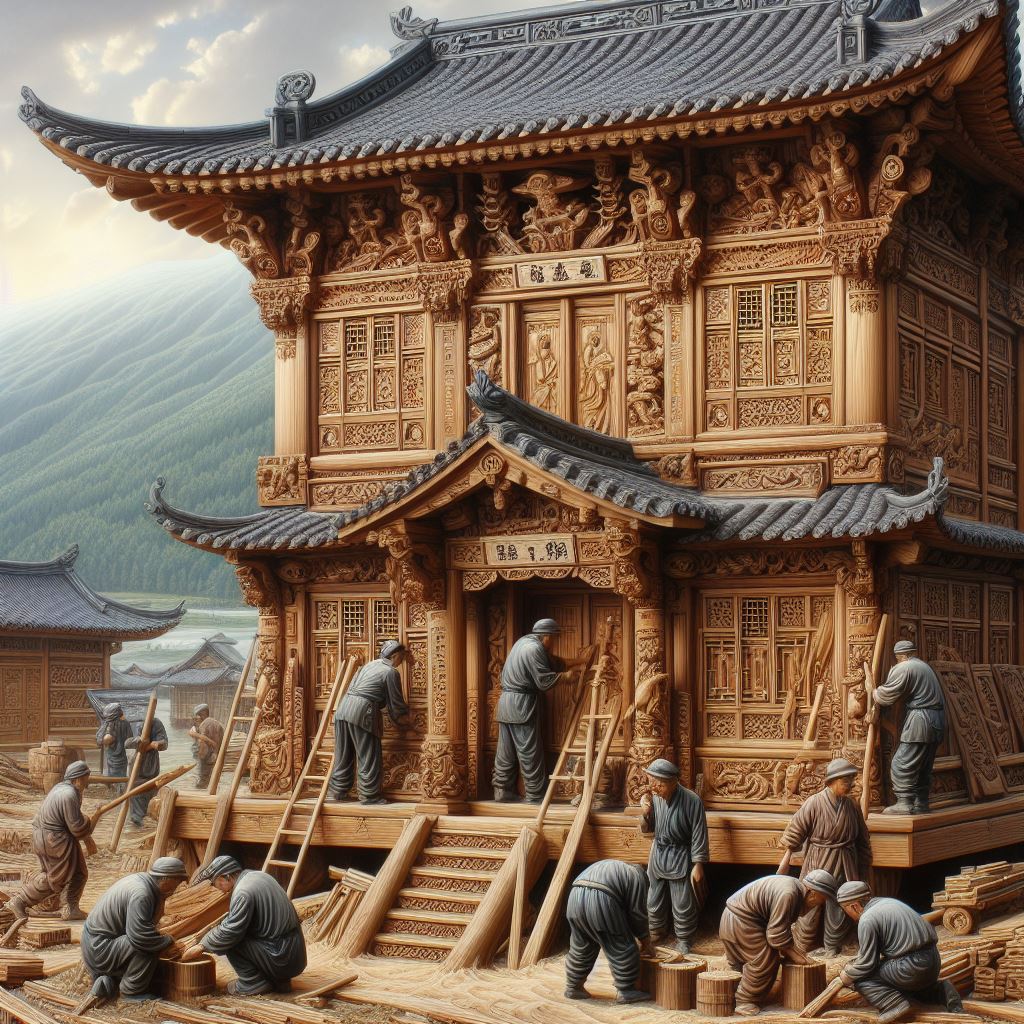Introduction
Preservationists play a crucial role in the real estate industry, ensuring the conservation and restoration of historic buildings.
They have the expertise to evaluate the historical significance of a property and recommend appropriate preservation techniques.
Real estate developers and investors can benefit from consulting preservationists to understand the potential value and restrictions associated with historical properties.
Preservationists can provide guidance on navigating the complex regulations and requirements related to historic preservation, helping to ensure compliance and avoid potential legal issues.
Their input can also help developers make informed decisions about how to integrate historic elements into their projects, balancing preservation goals with modern functionality and design.
By working closely with preservationists, real estate professionals can enhance the value of historic properties while respecting their historical and architectural integrity.
Their advice can help minimize the risk of costly mistakes and maximize the potential for success in historic real estate projects.
Therefore, it is essential for developers and investors to actively seek the expertise of preservationists before undertaking any projects involving historical properties.
Collaborating with preservationists can lead to significant benefits, both in terms of financial returns and the preservation of cultural heritage for future generations.
Who are Preservationists?
Preservationists play a crucial role in protecting and maintaining our cultural heritage.
They are individuals who specialize in preserving and conserving historic buildings, sites, and objects.
These professionals work diligently to ensure that our past is carefully safeguarded for future generations to appreciate and learn from.
Definition and role of preservationists
Preservationists are experts who have a deep passion for history and a strong commitment to preserving our collective heritage.
Their primary role is to protect and maintain historic buildings, places, and artifacts in order to retain their historical significance and cultural value.
Types of preservationists, such as historians, architects, archaeologists, etc.
Historians
Historians play a critical role in preservation efforts by researching and documenting the historical significance of buildings and sites.
They provide valuable insights into the context and stories behind each structure, helping to shape preservation decisions.
Architects
Architects specializing in preservation focus on rehabilitating and restoring historic buildings.
They work closely with historians and use their expertise to ensure that the rehabilitation process aligns with the building’s original design and historical integrity.
Archaeologists
Archaeologists contribute to the preservation field by studying and interpreting physical remains and artifacts.
Through their excavations and analyses, they uncover valuable evidence that aids in understanding and preserving our cultural heritage.
Conservators
Conservators are responsible for the treatment and preservation of artifacts and collections.
They utilize specialized techniques and materials to clean, repair, and stabilize objects, ensuring their longevity and accessibility for future generations.
Urban planners
Urban planners play a crucial role in preservation efforts by incorporating historic preservation into city planning and development.
They work towards creating sustainable and livable communities that value and integrate the preservation of heritage sites.
Legal experts
Legal experts specializing in historic preservation provide guidance and expertise on the legal aspects of preserving cultural heritage.
They navigate complex laws and regulations, ensuring that preservation projects comply with legal requirements.
Community advocates
Preservationists work closely with community advocates who are passionate about preserving local landmarks and cultural heritage.
These advocates play a vital role in raising awareness, rallying support, and mobilizing resources for preservation initiatives.
Non-profit organizations
Non-profit organizations dedicated to historic preservation provide funding, resources, and advocacy for preserving our cultural heritage.
They collaborate with preservationists and community stakeholders to protect and promote significant cultural sites.
Government agencies
Government agencies, such as national heritage departments or state historic preservation offices, play a crucial role in setting policies and regulations to ensure the protection of historic properties.
They provide support, guidance, and funding for preservation initiatives.
Educators and researchers
Educators and researchers in the field of preservation contribute to the advancement of knowledge and best practices.
They train the next generation of preservationists and conduct research to enhance our understanding of preservation techniques and strategies.
Preservationists, with their diverse backgrounds and expertise, are the guardians of our built heritage.
They work tirelessly to ensure that our past is not forgotten, but rather cherished and integrated into our present and future.
Without their dedication and expertise, we risk losing valuable connections to our history and cultural identity.
Read: Old Home Safety Checks Pre-Renovation
Why Consult Preservationists?
When it comes to the preservation and conservation of historical properties, consulting preservationists is essential.
Not only do they possess a wealth of knowledge and expertise regarding the historical and cultural significance of properties, but they can also provide valuable insights into zoning regulations and legal requirements.
Preservationists’ expertise in historical and cultural significance of properties
Preservationists are well-versed in the unique characteristics and historical context of properties, allowing them to assess their importance accurately.
Through their extensive research and understanding, they can help property owners and developers make informed decisions regarding their preservation and restoration efforts.
Understanding zoning regulations and legal requirements
Additionally, preservationists can guide property owners in navigating zoning regulations and legal requirements associated with historical properties.
They are familiar with the complex web of laws and restrictions that govern the use and modification of such properties, ensuring compliance and avoiding potential legal complications.
Enhancing property value through preservation efforts
Moreover, consulting preservationists can have a positive impact on property value.
Historical properties often possess intrinsic value due to their unique architectural features and historical significance.
Preservationists can provide guidance on preservation initiatives that not only maintain the integrity of the property but also enhance its market appeal and value.
Building sustainable and resilient communities
Besides, preservation efforts contribute to building sustainable and resilient communities.
Historical properties are an integral part of a community’s heritage and identity.
By preserving these properties, communities can revitalize their historical character, fostering a sense of pride and connection among residents.
This preservation approach also supports sustainable development by preventing urban sprawl and promoting the efficient use of existing infrastructure.
Adapting properties for modern use while preserving historical integrity
Lastly, preservationists play a crucial role in adapting properties for modern use while preserving historical integrity.
They can help property owners strike a balance between accommodating contemporary needs and maintaining the historical authenticity of a property.
This adaptive reuse approach ensures that historical properties remain relevant and functional in today’s society.
In short, consulting preservationists is essential for anyone involved in the preservation, restoration, or development of historical properties.
Their expertise in the historical and cultural significance of properties, understanding of zoning regulations, ability to enhance property value, contribution to sustainable communities, and facilitation of adapting properties for modern use make them invaluable partners in preserving our heritage.
Finding and Hiring Preservationists
Researching and Identifying Qualified Preservationists
Finding the right preservationist for your project requires thorough research and careful identification.
Start by scouring online platforms, such as professional networks and forums, that are specifically dedicated to preservationists.
Consider the qualifications and experience of preservationists you come across during your research.
Seeking Recommendations from Local Historical Societies or Organizations
Another effective method to find qualified preservationists is by seeking recommendations from local historical societies or organizations.
These organizations often have a deep understanding of the local preservation community and can provide valuable insights.
Reach out to them and ask for their recommendations based on your project’s specific needs and requirements.
Connecting with Preservationists through Online Platforms and Directories
Make use of online platforms and directories that connect preservationists with potential clients.
These platforms allow you to browse through profiles and portfolios of preservationists, helping you to find the right fit.
Choose platforms that have a robust review system, allowing you to gauge the reputation and quality of preservationists.
Evaluating Preservationists’ Portfolios, Qualifications, and References
When considering preservationists, it is essential to thoroughly evaluate their portfolios, qualifications, and references.
Review their previous projects and assess if their style aligns with your preservation goals and vision.
Check for certifications, licenses, and memberships in relevant preservation associations to verify their qualifications.
Reach out to their references and inquire about their professionalism, expertise, and overall satisfaction with their work.
Negotiating Fees and Establishing a Clear Scope of Work
Once you have identified potential preservationists, it’s crucial to negotiate fees and establish a clear scope of work.
Discuss your budget and project requirements with the preservationists and seek their input.
Ensure that you understand the breakdown of their fees, including any additional charges for specific services or materials.
Define the scope of work in a written agreement to avoid misunderstandings and clearly outline deliverables and timelines.
In fact, finding and hiring preservationists requires thorough research, seeking recommendations, utilizing online platforms, and evaluating credentials.
By following these steps, you can ensure that you find the right preservationist who aligns with your project’s needs and goals.
Read: Historic Window Restoration Techniques
Collaborating with Preservationists
Communication and Collaboration throughout the Real Estate Development Process
Effective communication and collaboration with preservationists is essential for successful real estate development projects.
Preservationists bring valuable expertise and knowledge to the table that can greatly enhance the preservation and restoration of historical properties.
By actively engaging with preservationists throughout the entire development process, developers can ensure that their projects meet both their profitability goals and preservation objectives.
Involving Preservationists in Property Assessments and Due Diligence
Preservationists should be included in the early stages of property assessments and due diligence to provide insights into the historical significance and potential challenges associated with a property.
Their expertise can help developers identify any preservation restrictions or requirements that may impact the project.
By involving preservationists early on, developers can proactively address preservation concerns and avoid costly surprises later in the development process.
Incorporating Preservationists’ Recommendations in Design and Renovation Plans
Preservationists’ recommendations should be carefully considered and incorporated into the design and renovation plans of historical properties.
Their input can help developers strike a balance between preserving the property’s historical integrity and implementing necessary modern updates.
By collaborating with preservationists in the design phase, developers can ensure that their plans align with preservation standards and guidelines.
Overcoming Potential Conflicts between Preservation and Profitability Considerations
Preservationists and developers may sometimes face conflicts between preserving a property’s historical value and achieving profitability in a development project.
However, through open communication and a willingness to find creative solutions, these conflicts can be overcome.
Preservationists and developers can work together to find compromises that preserve the property’s integrity while also meeting the financial goals of the project.
Leveraging Preservationists’ Knowledge for Marketing and Community Engagement
Preservationists’ knowledge and passion for historical properties can be leveraged to create unique marketing opportunities and enhance community engagement.
Developers can highlight the preservation aspects of their projects to attract buyers and investors who appreciate historic properties.
Additionally, collaborating with preservationists in community outreach initiatives can foster positive relationships with local stakeholders and gain community support for development projects.
In general, collaborating with preservationists throughout the real estate development process is crucial for successful preservation and restoration of historical properties.
Involving preservationists in property assessments and due diligence, incorporating their recommendations in design and renovation plans, and overcoming conflicts between preservation and profitability considerations are key steps in achieving a balance between preserving historical integrity and achieving development goals.
By leveraging preservationists’ knowledge for marketing and community engagement, developers can create sustainable and valued real estate projects.
Read: Renovation Tax Credits for Historic Homes

Potential Challenges and Solutions
Balancing preservation requirements with the property owner’s aspirations
- Understand the property owner’s vision and goals to find common ground.
- Empathize with their concerns and provide information on the benefits of preservation.
- Collaboratively develop a preservation plan that respects both the property’s history and the owner’s aspirations.
Obtaining necessary permits and approvals for preservation projects
- Research and understand the specific regulatory requirements and processes.
- Consult preservation experts and local authorities to navigate the permit application process smoothly.
- Ensure all necessary documentation and supporting materials are prepared in a timely manner.
Addressing budget limitations and finding creative funding sources
- Identify potential funding sources such as grants, tax incentives, or partnerships with local organizations.
- Develop a detailed budget that prioritizes preservation goals and explores cost-effective strategies.
- Seek community support through fundraising initiatives, crowdfunding campaigns, or seeking sponsorships.
Navigating conflicts between preservation goals and community development plans
- Engage in open and inclusive discussions with community stakeholders to understand their concerns and perspectives.
- Highlight the economic, cultural, and environmental benefits of preservation to gain community support.
- Seek compromise and find mutually beneficial solutions that align with both preservation goals and community development plans.
Resolving disagreements between preservationists and other stakeholders
- Encourage open communication and active listening to understand each party’s viewpoints.
- Seek common ground and identify shared objectives to build consensus.
- Engage in mediation or arbitration when necessary to find a resolution that satisfies all stakeholders.
In review, consulting preservationists can bring numerous benefits to a project, but it is essential to be aware of potential challenges that may arise.
Balancing preservation requirements with the property owner’s aspirations requires understanding and collaboration.
Obtaining necessary permits and approvals involves thorough research and communication with local authorities.
Addressing budget limitations may demand creativity in finding different funding sources.
Navigating conflicts between preservation goals and community development plans necessitates open discussions and compromise.
Lastly, disagreements between preservationists and other stakeholders can be resolved through active communication and mediation.
By acknowledging these challenges and finding suitable solutions, successful preservation projects can be achieved while considering the aspirations and needs of all parties involved.
Read: Old House Insulation: Best Practices
Case Studies: Successful Preservation Consultations
Real-life examples where preservationists played a crucial role
- The Olde Towne Restoration: Preservationists provided expertise in renovating historic buildings, attracting new businesses, and revitalizing the community.
- Preserving Heritage Landmarks: Preservationists worked with local authorities to protect iconic landmarks from demolition, ensuring their cultural significance.
- The Historic District Revival: Preservationists collaborated with homeowners to restore historic homes, increasing property values and fostering neighborhood pride.
- Conserving Natural Heritage: Preservationists assisted in preserving natural sites, promoting tourism, and protecting biodiversity in ecologically sensitive areas.
- Adaptive Reuse Success: Preservationists transformed abandoned industrial buildings into vibrant spaces for creative industries, boosting the local economy.
Positive outcomes and benefits of involving preservationists
- Cultural Preservation: Involving preservationists ensures that cultural heritage is conserved, fostering a sense of identity and pride for future generations.
- Economic Growth: Successful preservation consultations attract tourism, create jobs, and stimulate local economies through increased property values and business opportunities.
- Sustainability: Preservation supports sustainable development by utilizing existing infrastructure, reducing waste, and preserving historical resources.
- Community Engagement: Preservation consultations encourage community involvement, fostering a sense of ownership and connection to the local heritage.
- Education and Awareness: Preservationists educate communities about the value of their heritage, encouraging responsible stewardship of historic resources.
Restored properties that have become assets to their communities
- The Grand Theater Renovation: Once a dilapidated building, preservation efforts transformed it into a thriving cultural center for performing arts.
- Historic Downtown Revitalization: By preserving and renovating historic storefronts, the downtown area became a vibrant hub for local businesses and events.
- The Old Town Hall Transformation: Preservationists converted the historic town hall into a museum, preserving local history and attracting tourists.
- Reviving a Historic Park: Restoration of a neglected park with historical significance created a recreational space for the community to enjoy.
- Preservation of Native American Sites: By conserving sacred sites, preservationists honored the cultural heritage of indigenous communities.
These case studies illustrate the invaluable contributions of preservationists in various contexts.
Their expertise and dedication ensure the protection, restoration, and revitalization of cultural and natural heritage.
Through successful preservation consultations, communities experience economic growth, cultural preservation, and enhanced quality of life.
By involving preservationists, we can secure a sustainable future while cherishing our rich past.
Conclusion
In a world constantly evolving, embracing the wisdom of consulting preservationists becomes paramount.
These experts, custodians of our cultural legacy, offer insights that extend far beyond mere historical significance.
Real estate professionals, envision your projects as guardians of the past.
By prioritizing preservation, you forge a connection between the rich tapestry of history and the dynamic future of real estate.
The importance of consulting preservationists transcends nostalgia; it’s a strategic move.
Preserved properties weave narratives that resonate with a discerning clientele, elevating your projects to a league of their own.
As we conclude, let’s recap the benefits: authenticity, uniqueness, and a timeless allure.
Preservation isn’t just about aesthetics; it’s an investment in a sustainable future.
To real estate professionals, we implore you to be pioneers of preservation. In your ventures, prioritize the conservation of historical treasures.
The result? Not just properties, but legacies etched into the fabric of our society.
Embrace the long-term vision. Preserved properties not only stand as architectural marvels but also as sustainable assets in the real estate market.
The value appreciates, echoing the resonance of history in each brick and beam.
We champion not just the past, but a future where every project reflects the enduring spirit of our cultural heritage.
Let consulting preservationists be your guides, steering you towards a real estate legacy that withstands the test of time.




